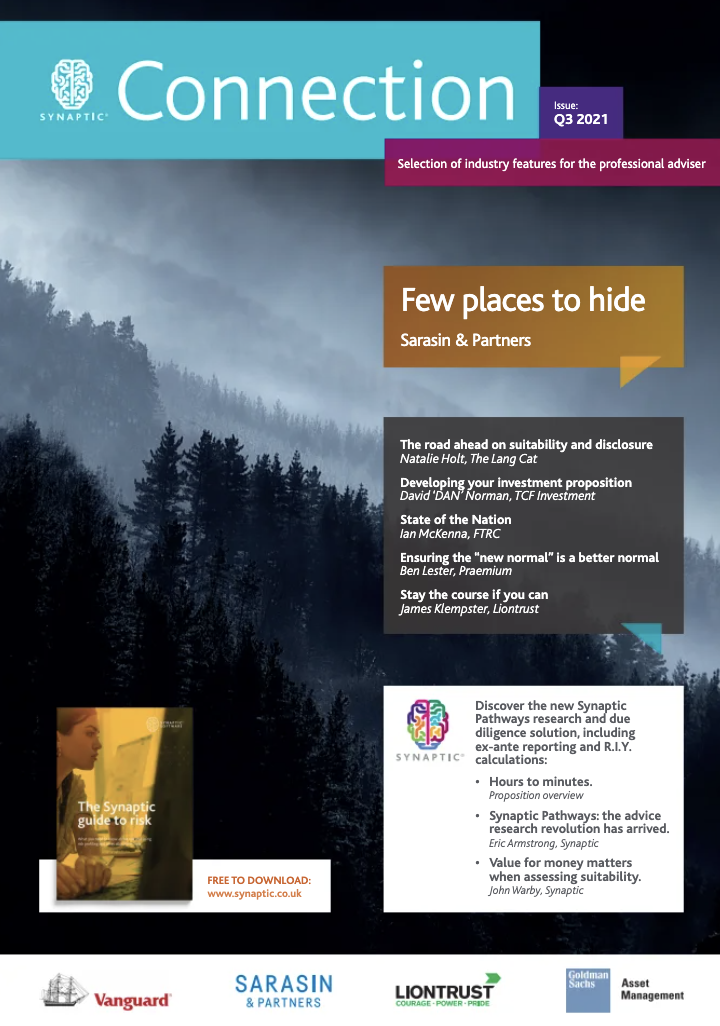In this edition...
- Hours to minutes Editorial team, Synaptic Software Limited
- Synaptic Pathways: the advice research revolution has arrived Eric Armstrong, Client Director, Synaptic Software Limited
- Value for money matters when assessing suitability John Warby, Senior Business Relationship Manager, Synaptic Software Limited
- The road ahead on suitability and disclosure Natalie Holt, Content Editor The Lang Cat
- Developing your investment proposition David A Norman (DAN), CEO TCF Investment
- State of the Nation Ian McKenna, Founder of Financial Technology Research Centre and AdviserSoftware.com FTRC
- Few places to hide Guy Monson, CIO and Senior Partner Sarasin & Partners
- Ensuring the “new normal” is a better normal Ben Lester, Head of Distribution – UK & International Praemium
- Stay the course if you can (but better too early than too late) James Klempster, Deputy Head of the Liontrust Multi-Asset team Liontrust
- Can financial goals be achieved through one fund? Mohneet Dhir, Multi-Asset Product Specialist Vanguard Europe
- Talking Trash: Why it’s not a waste of time Luke Barrs, Head of Fundamental Equity Client Portfolio Management for EMEA & Asia ex-Japan Goldman Sachs Asset Management
- Demand for growth funds rises amid risk-on environment Antony Champion, Head of Intermediaries Brewin Dolphin
- The best of both worlds Ian Jensen-Humphreys, Portfolio Manager Quilter Investors
- Global Sustainable Equity: a renewable, electric and digital future Hamish Chamberlayne, Head of Global Sustainable Equities | Portfolio Manager Janus Henderson
- Four steps to choose an ESG manager Daniel Ryan, Manager Research Analyst Fidelity International
- The path to retirement is changing … are you? Editorial team, Synaptic Software Limited
- Are unregulated investments ever a good idea? Jon Lycett, Business Development Manager RSMR
- Putting the children first Jacqui Gillies, Marketing and Proposition Director Guardian
- Why not Serious Illness Cover? Nick Telfer, Protection Development Manager VitalityLife
It's 26 years since I set up Financial Technology Research Centre, after spending 15 years working in and running various advice firms. At the time I had a vision of how technology could transform financial advice and my objective was to make it easier for IFAs to make that transition.

"A growing number of technology propositions are starting to deliver genuine automated advice. Not so-called robo advisers, who mainly just provide a different way of selling ETFs and model portfolios, invariably involving no robots and certainly no advice."
I may have been the first person to set up a business with fintech in the name. It has certainly taken far longer than I expected for technology to transform advice, but I believe we are on the cusp of enormous change.
An active debate at the end of the last decade was the merits of virtual meetings. Some advisers saw them as a great alternative to physical meetings, but many questioned if as much could be achieved talking to a client via computer. Had I suggested then we would spend over a year where such meetings were the only viable way of meeting with clients, most people would have suggested that I had lost the plot. But where would we have been without Teams and Zoom in the last 18 months?
A major side-effect of the pandemic is that many advisers are now thinking about technology differently across their businesses. Having found screen-share conference calls a very effective way to communicate with clients, there is an unparalleled appetite to explore what other technology can really help transform their firms.
I believe the most important part of an adviser's technology proposition is now what is put in front of clients, frequently referred to as the client portal. This is essentially a digital representation of the advice firm. Any major online direct-to-consumer investment service will confirm their busiest times are the commuting hours (whatever they may now be) and at weekends. Unless advisers want to spend longer hours in the office during the week and over the weekend, it's crucial to build a strong digital presence to represent your proposition when you are not working.
This is when consumers look for financial information. It's reasonable that their first port of call would be their own adviser, but if the information they need is not on the adviser's site, these clients will start looking in other places for information and if they find it somewhere else, they may return to that source on a regular basis.
Another crucial issue advisers need to decide is whether they will offer so-called hybrid advice? A growing number of technology propositions are starting to deliver genuine automated advice. Not so-called robo advisers, who mainly just provide a different way of selling ETFs and model portfolios, invariably involving no robots and certainly no advice. The next wave are systems that ingest huge amounts of data and, using very complex algorithms, run millions of models to optimise a client's position and identify the best possible scenario. Many years in the making, these are now coming to market. Their price point will be far lower than human crafted advice and there will still be an important role for advisers to explain the output, but the technology will do the hard work.
Predominantly these offerings will not compete with the traditional IFA market, but support a lower-cost form of advice which can make advice affordable again for millions of people, who have become excluded from receiving guidance because of a regulatory process that makes the advice they need, cost more than they can afford.
Perhaps the biggest question facing advice firms in the next few years is, 'Do you seek to offer such a service?' If you are just a few years from retirement there may be no need, but for younger advisers and firms that want real longevity, I think this is a crucial sector to embrace.
It's not going to be practical for the vast majority of firms to build their own such service, typically it can cost tens of millions of pounds to build a service to support the first customer, after that the cost of supporting every additional client is minimal. Most advice businesses will need to partner with, or rent such a service.
Advisers need more information on the technology available to them. Recently I was finally able to launch a service I have wanted to provide for years. On countless occasions people have said to me, "Ian, why don't you just review all the advice software in the market and put all of the information up on a website for advisers to access for free?" The answer is, that's a huge undertaking and it would need a lot of funding. Over the last few years the team at FTRC have built our Adviser Software Insights report. This document, which now runs to over 400 PowerPoint slides, is a comprehensive summary of the different advice technology available in the UK market. It is updated every month and used by many large insurance companies, investment platforms, asset managers and technology suppliers to maintain their understanding of the adviser software market. Subscribers can now also access all this content online, and we have built some extra technology so that we can provide most of this content free of charge to financial advice firms, thus providing the comprehensive information I have always wanted to supply to advisers. This can be found at https://www.advisersoftware.com/advice-tech-hub/
Amongst our plans for 2022 is a series of webinars on 'How to make your advice firm a digital business." In the sessions we will work through the complete end-to-end advice process, highlighting how various advice firms have successfully digitised the different parts of their business and their advice process, and what other advisers can learn from them. If you'd like to participate in this please drop me a message via LinkedIn and I will share more details.
I hope the above helps your thinking about how technology can best help your firm. I'd welcome any feedback on additional services and support advisers need.
Ian McKenna can be reached at ian.mckenna@ftrc.co.uk
Sign up for updates
Keep up to speed with everything you need to know each quarter, by email or post.


